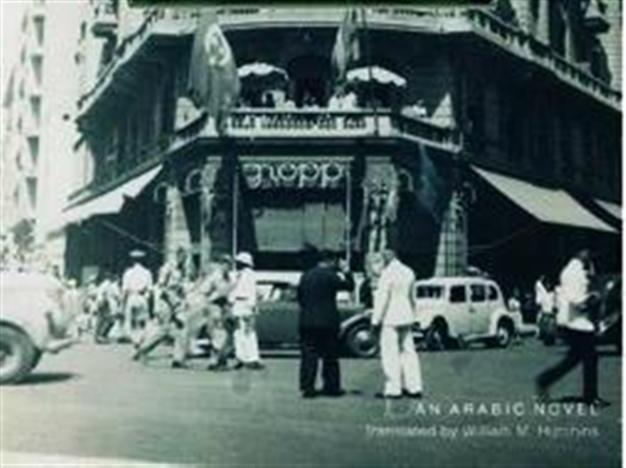‘Cairo Modern’
William ARMSTRONG - william.armstrong@hdn.com.tr
 ‘Cairo Modern’ by Naguib Mahfouz, trans. William M. Hutchins (The American University in Cairo Press, $20, 248 pages)
‘Cairo Modern’ by Naguib Mahfouz, trans. William M. Hutchins (The American University in Cairo Press, $20, 248 pages)Naguib Mahfouz is often described as the Egyptian Balzac. I’ve always found the phrase irritating: “The Chinese Albert Camus” or “the Ugandan Charles Dickens.” It’s never the other way round; you never hear western writers described as “the British Orhan Pamuk” or “the German Chinua Achebe.” The Nobel laureate Mahfouz was a master who captured the intricacies of 20th century Cairo like no one else; he shouldn’t be reduced to a knock-off “eastern” version of anybody. Balzacian he often was, but he was also far more, perfecting a unique style of dry, inimitable simplicity, bold characters, packing serious weight behind ostensible levity. Cairene society was depicted in a crisis of modernity, but Mahfouz’s tone was usually comic.
That tone is certainly there in his 1945 novel “Cairo Modern,” but it is also touched by a darker, more cynical quality than much of his other work, caustically indicting the hypocrisy of Cairo at the time. Set in the 1930s, it follows young university graduate Abd al-Da’im Mahgub, one of a group of student friends who act as convenient symbols of competing visions of where Egypt should go. One is a Comtean socialist, one is an Islamic fundamentalist, another is a member of the liberal nationalist Wafd party.
Mahgub himself is little more than an opportunist, whose “ironic, heartless mentality, audacity and boundless ambition” can be summarized by his favorite throwaway motto “tuzz.” When we first meet him, those ambitions are constantly frustrated by the hand he was dealt, the limits of his circumstances and the corrupt system of horse trading into which hapless students are propelled after graduating. As Mahgub himself observes near the beginning of the book: “Nothing astonishes me. The appointment of government officials is rigged, the award of contracts is rigged, and the elections themselves are rigged.”
Success is everywhere determined by nepotism. Someone tells the job-hunting Mahgub at one point that his qualifications are useless: “Don’t waste money on applying for a job. The question boils down to one thing: Do you have someone who will intercede for you? Are you related to someone in a position of power? Can you become engaged to the daughter of someone in the government?” Soon enough, however, an opportunity arises for Mahgub to do the latter. After months of miserable penny-pinching, he is offered a Faustian pact to - for the sake of appearances - become the husband of a well-connected official’s mistress. At first the idea is horrifying, but Mahgub quickly rationalizes it, and what’s more his new wife Ihsan is beautiful and charming. Anyway, Mahgub had never been one to allow moral scruples cloud prospects for his own success.
Thus, he is thrust from destitution into a luxuriant life of society parties on the Nile, richly connected, comfortable and complacent. It’s a fraudulent world that encourages people who are good at concealment, and where the “true dress uniform is a cloak of hypocrisy.” Honor can be easily traded in so long as only Mahgub’s superior knows about it. In fact, he realizes more deeply than ever that “only the poor are handicapped by honor”: “An idiot considers a cuckold’s horns disgraceful, whereas I see them as a precious ornament. The two horns cause no harm, whereas hunger… I may be anything, but I’m not a fool. A fool angrily refuses a position on account of something he terms honor.” In the (slightly heavy-handed) metaphor, Mahgub has effectively prostituted his wife for social advancement, but feels few of the ordinary moral compunctions. His nihilism turns out to suit hypocritical Cairo society unexpectedly well.
The problem is that the arrangement is, under the surface, more fragile than he realizes. It’s probably not a plot spoiler to reveal that things don’t end up happily ever after. At the end, the whole thing comes together to complete its tragic arc, and the reader is left to marvel at Mahfouz’s technical handiwork. It’s true that Mahgub’s friends get quite unceremoniously shunted off stage just a few chapters in, but otherwise the tightness and pacing of the narrative is exemplary. “Cairo Modern” is a bleak read, portraying a society where there are plenty of reasons to hate or dislike people and few reasons to love them. But there are still plenty of good jokes - like Balzac, Mahfouz was a master at whistling past the graveyard.
Notable recent release

‘The Balkan Wars: British Consular Reports from Macedonia in the Final Years of the Ottoman Empire’ Edited by: Bejtullah D. Destani, Robert Elsie
(I.B. Tauris, £58, 288 pages)










